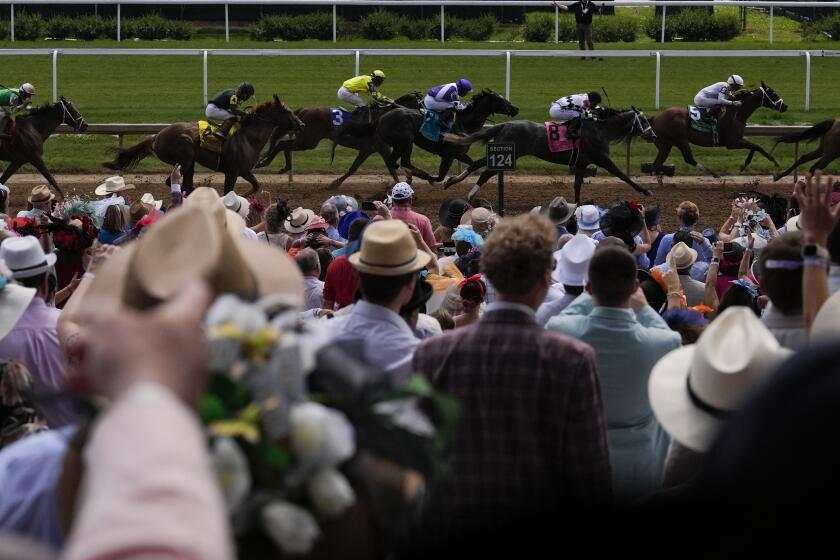Vincent Plays No Favorites, but Fast Becomes One
- Share via
The funniest line ever written about a baseball commissioner came at the expense, predictably, of Bowie Kuhn, of whom it was said during the strike of 1981, “This would never have happened if Bowie Kuhn had been alive today.”
The unspoken reference was to Kenesaw Mountain Landis, the hanging judge turned commissioner, who is generally credited with having whipped baseball into shape after the Black Sox gambling crisis, if in much the same way that Mussolini made the trains run on time. Kuhn couldn’t whip a meringue pie into shape, much less George Steinbrenner.
But no one is making jokes about the current officeholder, Fay Vincent, unless it’s about his name. (David Letterman said that one of the clauses in the new labor agreement was that the commissioner, to avoid further embarrassment, would from now on be known as Vince.) Vincent was a visible figure in the recent negotiations between players and owners, playing the role of commissioner as most of us might envision it, which is to say not as an owners’ toady, in the old style.
He didn’t end the lockout himself, but he loomed large, if only by making it clear that an impasse was unacceptable to him. In the process, Vincent presented himself as the game’s conscience, publicly reminding both sides of their responsibilities to the paying public.
And in the aftermath of that performance, Vincent could lay claim to previously uncharted territory, as a commissioner respected and maybe even embraced by players and owners alike. Most commissioners, it turns out, were not liked by either side.
Vincent, who visited the Baltimore Orioles camp in Sarasota, Fla., Saturday in the company of team owner Eli Jacobs, met the press and suggested that he didn’t understand how a commissioner could avoid becoming involved. It’s his job, isn’t it?
“I don’t think a commissioner can see baseball being hurt without making an effort to do something about it,” Vincent was saying. “That’s what I’m supposed to do. The question really becomes: What can you do that’s useful? I tried. I like to think I was somewhat useful.”
In preparing for the negotiations, Vincent did a little more than just read the papers. He even went so far as to consult Marvin Miller, the former union chief who is, to most owners, only the devil incarnate. And since the strike ended, he has talked repeatedly about the necessity of both sides learning to trust the other. He said something remarkable Saturday -- that collusion by the owners during the last contract was at the heart of the dispute.
The owners don’t like to talk about collusion, which is not surprising. Most guilty parties are loath to discuss their crimes. But it was collusion that poisoned the atmosphere of the negotiations, and Vincent not only was quick to recognize it, but also was willing to say it aloud.
“Obviously, the single biggest problem in these negotiations was the background of collusion,” Vincent said. “The element of distrust has got to be improved and corrected. Collusion was a very big reality in these negotiations. I think it made it difficult for players to trust the owners about the economic future of baseball.”
The players don’t trust the owners, but they’re coming to trust the commissioner. If Vincent is what he appears to be -- an honest man -- then you have to wonder about some of his associations. He was once head of Columbia Studios, and now he’s head of baseball. Integrity is not a word easily bandied about in either show biz or the baseball biz. But baseball may be an even tougher game.
Yes, his studio did produce “Ishtar,” but in Vincent’s six months as commissioner, he has seen his first World Series interrupted by an earthquake and his first season delayed by labor troubles. And now the umpires are making his life just a little more miserable.
But if baseball hasn’t been so great to him, he has been OK for baseball. His predecessor, Bart Giamatti, died and has since been all but canonized as the scholar-commissioner who gave literary life to the game. But Giamatti was also known as a union buster when he was president at Yale. Who knows how well he might have handled the labor impasse? After Kuhn and before Giamatti was Peter Ueberroth, who largely took credit for everything that went right in baseball and blamed somebody else for everything that went wrong.
The new guy seems serious about his job. From all appearances, he’s not running for governor or for sainthood.
“I think it’s one of the great responsibilities someone can have in life,” Vincent said. “It’s hard for me to think of anything that would be more wonderful, exciting and challenging to do than what I’m doing. When the game is afflicted, when there are major problems, I take it pretty seriously. Therefore, I was very relieved when we got it straightened out. I think it was a fitting resolution. I just wish we could have done it a month earlier.”
The problem now is next time, which no one wants to be like the past few times. Vincent says that there will be no collusion so long as he is commissioner, and he has plans to cement his relationship with union chief Donald Fehr. If Vincent can smooth the way for an agreement without a work stoppage when the contract ends in four years, he would secure a place in commissioner history, and without an accompanying laugh track.
More to Read
Go beyond the scoreboard
Get the latest on L.A.'s teams in the daily Sports Report newsletter.
You may occasionally receive promotional content from the Los Angeles Times.










